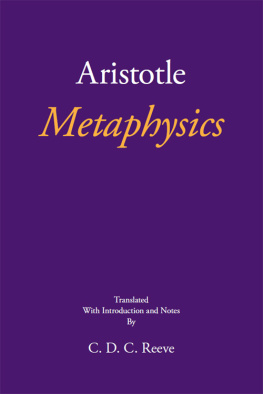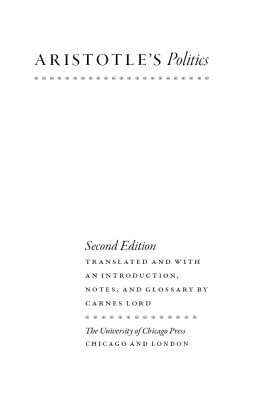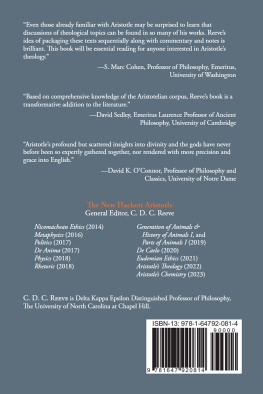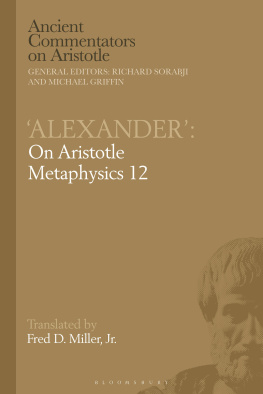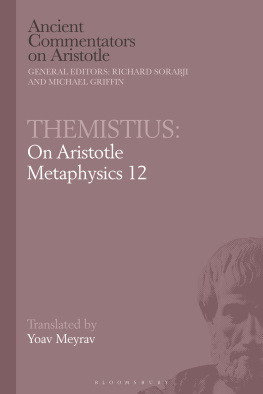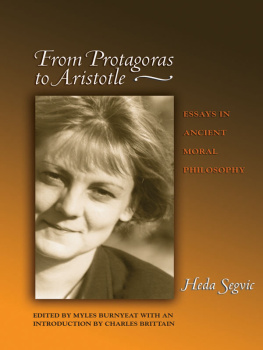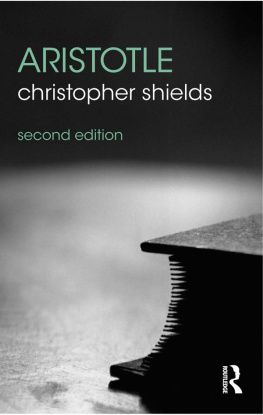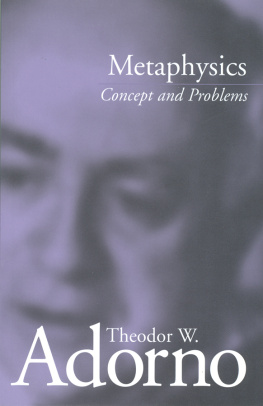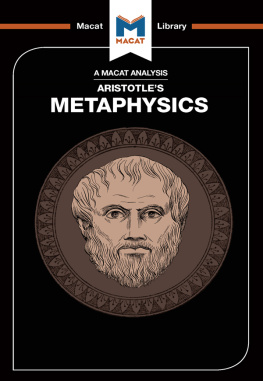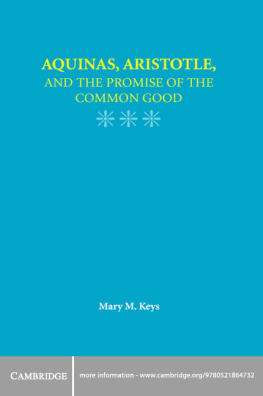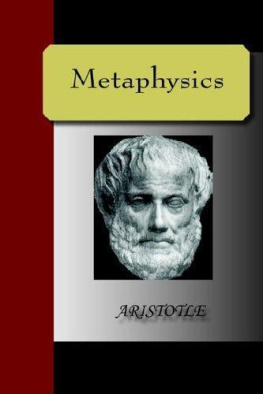Aristotle - Metaphysics
Here you can read online Aristotle - Metaphysics full text of the book (entire story) in english for free. Download pdf and epub, get meaning, cover and reviews about this ebook. year: 2016, publisher: Hackett, genre: Religion. Description of the work, (preface) as well as reviews are available. Best literature library LitArk.com created for fans of good reading and offers a wide selection of genres:
Romance novel
Science fiction
Adventure
Detective
Science
History
Home and family
Prose
Art
Politics
Computer
Non-fiction
Religion
Business
Children
Humor
Choose a favorite category and find really read worthwhile books. Enjoy immersion in the world of imagination, feel the emotions of the characters or learn something new for yourself, make an fascinating discovery.
Metaphysics: summary, description and annotation
We offer to read an annotation, description, summary or preface (depends on what the author of the book "Metaphysics" wrote himself). If you haven't found the necessary information about the book — write in the comments, we will try to find it.
Metaphysics — read online for free the complete book (whole text) full work
Below is the text of the book, divided by pages. System saving the place of the last page read, allows you to conveniently read the book "Metaphysics" online for free, without having to search again every time where you left off. Put a bookmark, and you can go to the page where you finished reading at any time.
Font size:
Interval:
Bookmark:
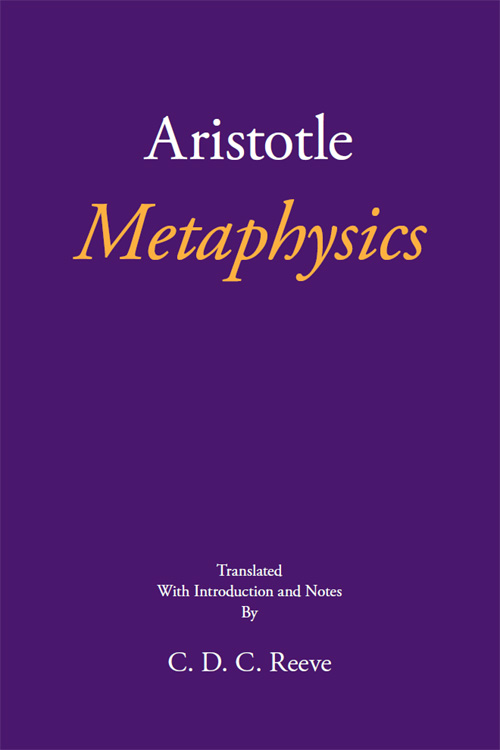
Aristotle
Metaphysics
Aristotle
Metaphysics
Translated
With Introduction and Notes
By
C. D. C. Reeve
Hackett Publishing Company, Inc.
Indianapolis/Cambridge
Copyright 2016 by Hackett Publishing Company, Inc.
All rights reserved
Printed in the United States of America
19 18 17 16 1 2 3 4 5 6 7
For further information, please address
Hackett Publishing Company, Inc.
P.O. Box 44937
Indianapolis, Indiana 46244-0937
www.hackettpublishing.com
Cover design by Deborah Wilkes
Interior design by Elizabeth L. Wilson
Composition by Aptara, Inc.
Library of Congress Cataloging-in-Publication Data
Aristotle, author.
[Metaphysics. English]
Metaphysics / Aristotle ; translated with introduction and notes by
C.D.C. Reeve.
pages cm
Includes bibliographical references and index.
ISBN 978-1-62466-439-7 (pbk.) ISBN 978-1-62466-440-3 (cloth)
1. MetaphysicsEarly works to 1800. I. Reeve, C. D. C., 1948 II. Title.
B434.A5R44 2016
110dc23 2015036145
epub ISBN: 978-1-62466-512-7
For
My Teachers and Students
,
Aristotle, Politics . Translated, with Introduction, by C. D. C. Reeve.
Aristotle, Nicomachean Ethics . Translated, with Introduction and Notes, by C. D. C. Reeve.
Plato, Republic . Translated from the New Standard Greek Text, with Introduction, by C. D. C. Reeve.
Contents
The page numbers in curly braces {} correspond to the print edition of this title.
Theoretical wisdom as a science concerned with primary causes and starting-points.
Wisdom as the science of god.
The four causes: formal, material, moving, final. Earlier thinkers recognized the material cause: Homer, Hesiod, Thales, Anaximenes, Diogenes, Hippasus, Heraclitus, Empedocles, Anaxagoras, Parmenides, Hermotimus.
The moving cause: Hesiod, Empedocles, Anaxagoras, Leucippus, Democritus.
The starting-points of mathematics as the starting-points of beings: Pythagoreans.
Plato and Forms.
Earlier thinkers latched on to the material cause and moving cause, but not the formal one, although Plato touches on it, as do he and others on the final cause. No one mentions any others.
Errors of the physicists, including positing elements of bodies only, though non-bodily ones are also beings, as the Pythagoreans recognized.
Criticisms of Plato and the Platonists.
Earlier thinkers touched only vestigially on the four causes and on none beyond them. How to achieve a puzzle-free condition about these causes.
The primary causes of beings are, as such, clear by nature, but our understanding of them is clouded.
Arguments that there must be some starting-point or primary cause of beings.
The audience for the Metaphysics must already be well educated.
A list of the fourteen puzzles (P114) about primary starting-points and causes that need to be resolved.
Discussion of P15.
Discussion of P67.
Discussion of P811.
Discussion of P14.
Discussion of P12, P13, P14a (not listed in 1).
The science of being qua being introduced and contrasted with the special sciences.
Something is said to be in many ways, but with reference to one thing and one nature, making a science of it possible. Tasks for the science of being qua being.
Getting a theoretical grasp on what mathematicians call axioms is one such task. The most stable starting-point of all (PNC) introduced and characterized.
A defense of PNC in seven arguments (A17).
Discussion of Protagoras argument that man is the measure of all things.
The discussion continued.
Discussion of PEM.
Discussion of the view that nothing is true and of the view that everything is true.
Starting-point.
Cause.
Element.
Nature.
Necessary.
One.
Be.
Substance.
Same.
Opposite.
Prior and Posterior.
Capacity, Potentiality, Power.
Quantity.
Quality.
Relative.
Complete.
Limit.
On the Basis of Which.
Disposition.
Having or State.
Affection.
Lack.
To Have or Hold.
Of or From.
Part.
Whole.
Docked.
Genus or Race.
False.
Coincident.
The three theoretical philosophiesmathematical, natural, and theologicaland the differences between the essences that are their starting-points.
Coincidental being and why there is no science of it. What happens for the most part.
Starting-points of coincidental beings. Luck.
Being in the sense of being true.
Substance as primary being. What is being = what is substance.
Are there any substances beyond perceptible ones?
A sketch of substance. Substance as primary underlying subject. Form as substance.
Logico-linguistic investigation of essence and definition.
Discussion of definition continued.
Discussion of essence continued: is each thing the same as its essence?
Form in matter-form compounds.
Form in matter-form compounds continued.
Form in matter-form compounds continued.
Definition and its relation to form.
Form and its parts.
Definition again.
Are universals substances?
Are Platonic Forms separable substances?
No definitions or demonstrations of what is particular, and so none of Platonic Forms either.
Most of the things that seem to be substancesparts of animals, the four elementsare in fact capacities.
A fresh start on substance looking to its role as starting-point and cause.
Summary of Zeta.
Substance as activation of perceptibles.
Composite substances vs. their activations.
The matter of composite substances.
How the matter of a thing is related to its contrary states.
What makes a definiens or a definiendum one?
Potential being (capacities).
Rational and non-rational capacities.
The Megarians on capacities.
Capacities and incapacities.
Capacities and their acquisition. More on rational capacities.
Being as activity. What activity is.
When a given thing is potentially something.
The priority of activity to potentiality.
Activity more estimable than potentiality. Activity and potentiality in knowledge and understanding.
True and false being. The case of incomposites. Understanding and error.
The ways in which beings are said to be intrinsically one. What the being for one is vs. what things are one.
The substance and nature of the one.
The one and the many: same, similar, distinct (or other), different, contrary.
Contrariety.
Puzzles about how the equal is opposed to the great and the small.
Puzzles about how the one is opposed to the many.
Contraries and intermediates.
Distinctness in species.
Puzzles about distinctness and species. The case of female and male.
Things capable of passing away and things incapable of doing so must be distinct in genus.
The puzzles from Beta revisited: P18.
More puzzles: P916.
Gamma 12 revisited.
Parts of Gamma 3 revisited.
Parts of Gamma 3 revisited.
Parts of Gamma 4 and 5 revisited.
Epsilon 1 revisited.
Epsilon 24 revisited.
Parts of Physics III recapitulated.
Parts of Physics III recapitulated.
Parts of Physics V recapitulated.
Parts of Physics V recapitulated.
Substance and its varieties: (1) perceptible and capable of passing away; (2) perceptible and eternal; (3) immovable. The nature of change.
Matter and change. Change from what is potentially to what is actively.
Font size:
Interval:
Bookmark:
Similar books «Metaphysics»
Look at similar books to Metaphysics. We have selected literature similar in name and meaning in the hope of providing readers with more options to find new, interesting, not yet read works.
Discussion, reviews of the book Metaphysics and just readers' own opinions. Leave your comments, write what you think about the work, its meaning or the main characters. Specify what exactly you liked and what you didn't like, and why you think so.

